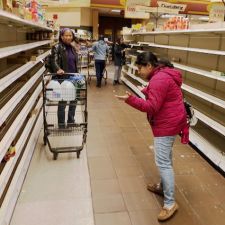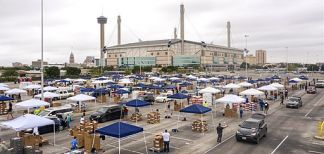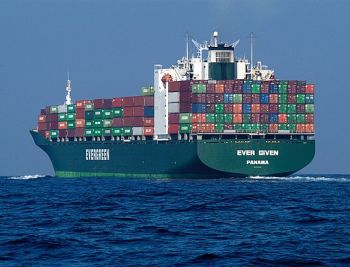August 2021
 The coronavirus pandemic disrupted supply chains worldwide and revealed vulnerabilities on a scale never before witnessed. From shortages of personal protective equipment (PPE) to empty grocery store shelves, we saw firsthand the fragility of global supply chains. Establishing coherent national policies for acquiring, stockpiling, and distributing vaccines, PPE, medicines, food, and other critical supplies remains a challenge to surmount as we combat the current pandemic and prepare for future pandemics and other disasters.
The coronavirus pandemic disrupted supply chains worldwide and revealed vulnerabilities on a scale never before witnessed. From shortages of personal protective equipment (PPE) to empty grocery store shelves, we saw firsthand the fragility of global supply chains. Establishing coherent national policies for acquiring, stockpiling, and distributing vaccines, PPE, medicines, food, and other critical supplies remains a challenge to surmount as we combat the current pandemic and prepare for future pandemics and other disasters.
Healthy supply chains are essential to the country’s economic security and the well-being of society as a whole. Keeping critical supply chains functioning is, therefore, important to the Department of Homeland Security (DHS), and university-led DHS Centers of Excellence—like CCICADA—have an important role to play. Shortly after the start of the pandemic, a COE COVID-19 Supply Chain Initiative was formed to help define that role. Led by CCICADA, the Initiative began with a plan to organize two workshops to bring together participants from the COEs, government agencies, and the private sector to learn from key stakeholders. Ultimately, the Initiative held seven short online workshops during the period from  August 2020 through the end of June 2021. The events, with links to summary articles on the CCICADA website, are:
August 2020 through the end of June 2021. The events, with links to summary articles on the CCICADA website, are:
- August 21, 2020: Enhanced Supply Chain Crime During the Pandemic
- August 21, 2020: Supply of Labor During the Pandemic
- August 27, 2020: Food Supply Chain During the Pandemic
- August 27, 2020: Supply Chains for Medicines, Vaccines, PPEs during the Pandemic
- January 7, 2021: COVID-19 Vaccines: Efficacy & Safety
- January 8, 2021: COVID-19 Vaccines: Distribution & Prioritization
- June 26, 2021: Suez Canal Incident: Impact & Implications for the Global Maritime Supply Chain
From a supply chain perspective, the pandemic has been an evolving crisis. As issues such as PPE shortages abated, new challenges—most notably the wide-scale manufacturing and distribution of vaccines—emerged. The long duration of the COVID disruption also saw the supply chain respond to overlapping shocks, such as the Suez Canal incident and the widespread power outages in Texas in March 2021. The Initiative responded by adding new events to explore emerging COVID-related challenges to supply chains. Each event featured speakers with front-line knowledge who were eager to share their experiences and perspective with DHS and the COEs. These experts represented industry, nonprofit organizations, and academia, as well as local, state, and federal government agencies, including several areas of DHS. Adding to this, the Initiative involved eleven COEs providing organizers and/or speakers for the events. In this article we present a few brief highlights from each workshop to provide a sense of the breadth and depth of participation.
The Workshop on Enhanced Supply Chain Crime During the Pandemic explored two major threads: 1) criminal activity that sprung up (often online) to exploit the pandemic and 2) the special challenges faced in remote areas that led to greater opportunity for crime and difficulty in enforcement during the pandemic. On the first topic, we heard about issues like the sale of counterfeit supplies and PPE, theft, price gouging, and hoarding from experts that included the Assistant Director of the Operational Technology and Cyber Division of DHS Homeland Security Investigations. Among the speakers addressing the second topic were the retired State of Alaska Deputy Commissioner for Public Safety and the head of the Arctic Policy Office at U.S. Coast Guard Headquarters. They spoke about the vulnerability of remote areas and how the pandemic heightened crime in such regions by making them effectively even more remote and fragile.

The Workshop on Supply of Labor During the Pandemic considered issues of workplace safety and the potential economic costs of workforce issues. Among the speakers were the Chief Economist to the AFL-CIO and the Chief Economist at DHS’s Cybersecurity and Infrastructure Security Agency (CISA). The former explained that, for people of color, COVID-19 is a workplace issue. African American and Latinx workers—while no more likely to suffer comorbidities such as diabetes, cardiovascular disease, chronic lung disease, or severe obesity—are more likely to be employed in professions with exposure to the public and other workers, and they have less ability to work remotely. The latter discussed projections on the extent that COVID-19 would reduce US GDP and employment.
The Workshop on the Food Supply Chain During the Pandemic showcased government agencies and nonprofits working together and separately to combat hunger and protect the food supply—work that was of heightened importance during the pandemic. A panel on Hunger Relief featured Feeding America’s Chief Supply Chain Officer, Texas Hunger Initiative’s Statewide Field Director, and a Deputy Commissioner at the New York State Department of Agriculture and Markets. Together, they laid out the deep and immediate impact of COVID-19 on food insecurity, described how traditional distribution channels became inoperative and volunteer assistance decreased sharply, and illustrated innovative new partnerships that formed in response. A second panel considered security of the food supply from a national perspective. In what turned out to be a timely prediction in light of the June 2021 cyber attack on meat processor JBS, they cautioned that the sophistication of attackers and the poor state of cyber defense in the food industry posed a significant national risk.
The Workshop on Supply Chain for Medicines, Vaccines, PPEs During the Pandemic featured a panel on vaccines and another on medicines and PPE—both with robust industry representation. In the first panel, a Senior Vice President at Merck described a typical vaccine development process as a contrast to the race for a COVID vaccine that was then underway and noted that the scale of the COVID vaccination effort was unlike anything previously attempted. In the second panel, a Vice President at 3M—a leading manufacturer of PPE—described innovative ways 3M was collaborating with other companies and with government to ramp up production of PPE and other medically necessary products.
The January 2021 Workshop on Vaccine Efficacy & Safety featured experts from the companies that were most in the news—Pfizer and Moderna. Workshop attendees learned about the very latest vaccine trial results from the leader viral vaccine R&D programs at Pfizer, a Senior Vice President at Moderna, and academic experts in vaccinology and immunology. They shared safety and efficacy data, showed the approximate timing of protective immunity, and drilled down to discuss vaccine efficacy in several subgroups of interest. A panelist from the FDA then described the licensing and approval process for vaccines, with a special emphasis on the Emergency Use Authorizations granted to Pfizer and Moderna. Finally, a scientist from the Bill & Melinda Gates Foundation described the outlook for vaccines reaching low and middle income countries and noted the Foundation’s concern that inequality in vaccine distribution was a looming global threat. Taken together, the speakers provided an end-to-end view of the vaccine development process, the wide range of vaccines under development, the potential risks of vaccine-induced mutation, and the global scale of the vaccination effort.
The Workshop on Vaccine Distribution & Prioritization included presenters involved in vaccine distribution from many different vantage points. The Deputy Chief of Supply, Production, and Distribution for Operation Warp Speed offered an overview of the federal government’s streamlined process for distributing vaccines to end-use locations. The Chief Medical Officer at Walgreens—representing one of those end-use locations—spoke about the company’s partnership with Operation Warp Speed to administer vaccines to residents of long-term care facilities and its plans to assist in vaccinating the general population. With the vaccination rollout still just beginning, the Commissioner of Public Health Services in New Jersey described the state’s plan for vaccine rollout that included a mix of mega-sites, hospitals, county health facilities, physicians’ offices, and retail pharmacies. Finally, a community health aide from Alaska offered unique perspective on vaccine distribution to the nation’s farthest reaches in Alaska’s Kodiak archipelago.
With global supply chains slowly recovering from system-wide impacts of the ongoing pandemic, they were confronted with another challenge—a massive container ship blocking one of world’s busiest shipping lanes. The June 2021 Workshop on the Suez Canal Incident explored the impact of the six-day closure of the Suez Canal that stranded more than 400 vessels after the container ship Ever Given ran aground. Speaking from extensive experience, the workshop’s keynote speaker Rear Admiral Brian Penoyer of the US Coast Guard gave numerous examples and presented several ideas related to resilience in maritime transport systems and the supply chain more broadly. The panelists who followed collectively represented decades of experience overseeing some of the nation’s largest ports and waterways, as well as some of its most remote. The participants pointed out that, while the Suez Canal incident had relatively minor impact, it could have been much worse. They also noted that, while tempting to consider in light of retreating Arctic sea ice, the shorter route across the Arctic is not a viable alternative for container shipping. Projections indicate that—even by as late as 2050—the Arctic Ocean will remain largely ice covered for 6 to 8 months a year, rendering it impassible for all but the most ice-capable of ships.
Each event included participants from government, industry, academia, and non-profit organizations, collectively representing a wide range of backgrounds. Registered participants at the vaccine workshops, included not only representatives of the three companies whose vaccines are authorized in the US—Pfizer, Moderna, and Johnson & Johnson—but also Mexican pharmaceutical Avimex, the US Cattleman’s Beef Association, and Germany’s Friedrich Loeffler Institute for farm animal health, among others. The workshop on the Suez Canal incident showcased the expertise of US Coast Guard officers, as well as leaders of the nation’s busiest ports—Los Angeles/Long Beach and New York/New Jersey—and drew participants from the Royal Canadian Mounted Police and the UK’s Royal Navy. DIMACS prides itself on bringing together diverse groups at its workshops, but these CCICADA events set a very high bar!
Printable version of this story: [PDF]


